This post was updated Feb. 5 at 11:28 p.m.
On Jan. 23, 1923, a group of women came together to charter the Pi Chapter of Delta Sigma Theta Sorority, Incorporated at UCLA. This was the first Greek-letter organization established at the university, regardless of race and gender. A few months later, on April 25, Kappa Alpha Psi Fraternity, Inc. chartered the Upsilon, the first fraternity on campus.
Both organizations established a presence, defining Greek life at The Southern Branch of the University of California, a two-year letters and science institution located off Vermont Avenue, which would later become UCLA as we know it.
A century later, they are now joined by eight of the nine historically Black fraternities and sororities of the National Pan-Hellenic Council, widely known as the Divine Nine. The fraternities and sororities represented at UCLA include Kappa Alpha Psi Fraternity, Inc., Alpha Phi Alpha Fraternity, Inc., Phi Beta Sigma Fraternity, Inc., Omega Psi Phi Fraternity, Inc., Delta Sigma Theta Sorority, Inc., Alpha Kappa Alpha Sorority, Inc., Zeta Phi Beta Sorority, Inc. and Sigma Gamma Rho Sorority, Inc.
Each organization balances tradition and embodies its founders’ visions through innovation. With valuable opportunities for professional and personal development, Divine Nine provides a space for many Black students to thrive and build a strong sense of community. However, their presence and history on campus often go unrecognized.
In January 2023, I remember standing in the cold with my neighbors from the Afrikan Diaspora Living Learning Community, watching the centennial celebration step-show for Delta Sigma Theta at Bruin Plaza. I was unaware that they were the first Greek-letter organization at UCLA until a Delta proudly shouted it to the audience, proceeding to stomp a beat with her sorority sisters.
I was stunned. I had no doubt it was true, but I still could not believe it. The Divine Nine is cherished in the Black community, with its influence extending to my family. I have aunts who are members of Delta Sigma Theta, an uncle in Phi Beta Sigma and my father, a member of Alpha Phi Alpha. My mom and older brother also graduated from UCLA.
No one knew about the history of these organizations’ presence on campus.
Ashley Anderson, a fourth-year sociology student and the vice president of the Delta Sigma Theta Pi chapter, said her sorority’s history was not documented in newspapers until about the 1960s, even though it was chartered at UCLA in 1923.
“There’s just gaps of history, and that was due to the campus climate, … racial climate at the time, and so … those archives are lost and things that we can’t get back,” Anderson added.
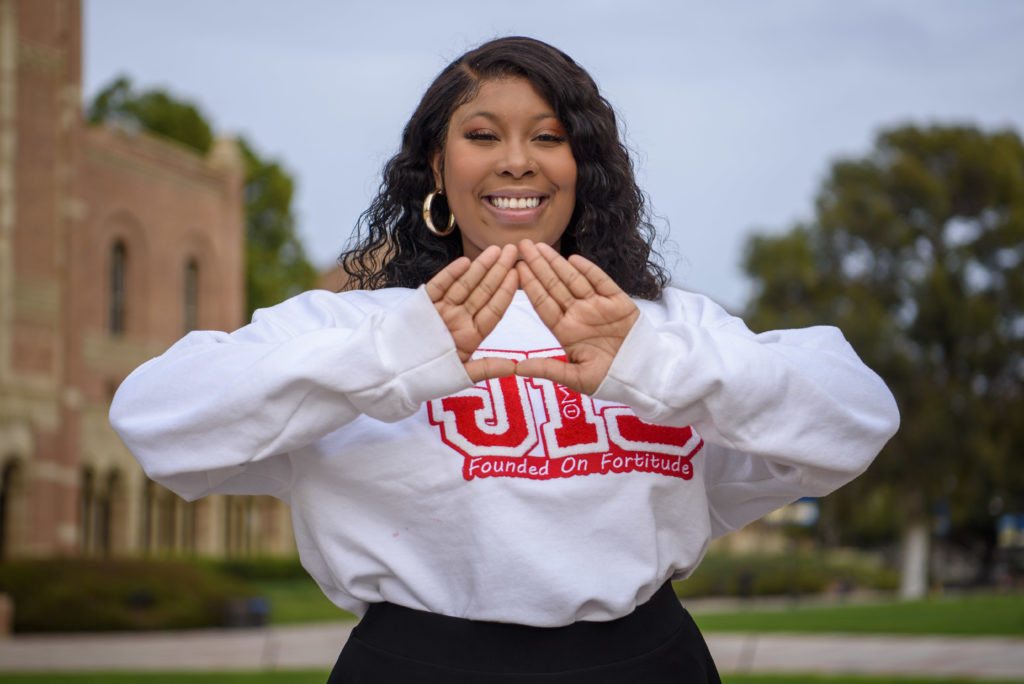
Losing its history left her sorority at a disadvantage when trying to commemorate its 100 year celebration and the trailblazers who paved the way. Nevertheless, in remembrance, UCLA commissioned two plaques for Delta Sigma Theta and Kappa Alpha Psi near Kerckhoff Hall.
The plaques act as timeless representations to observe these organizations’ significant roles in history. But on college campuses, having a house on fraternity or sorority row can be seen just as substantial as a plaque, if not more.
“It’s crazy to me that all these other fraternities and sororities are able to get that recognition, … able to have houses with their Greek letters out for everyone to see,” said Christian Harris, a second-year psychology student and member of Kappa Alpha Psi. “Being one of the first orgs and one of nine of the National Pan-Hellenic Council, why can’t we be recognized more on campus?”
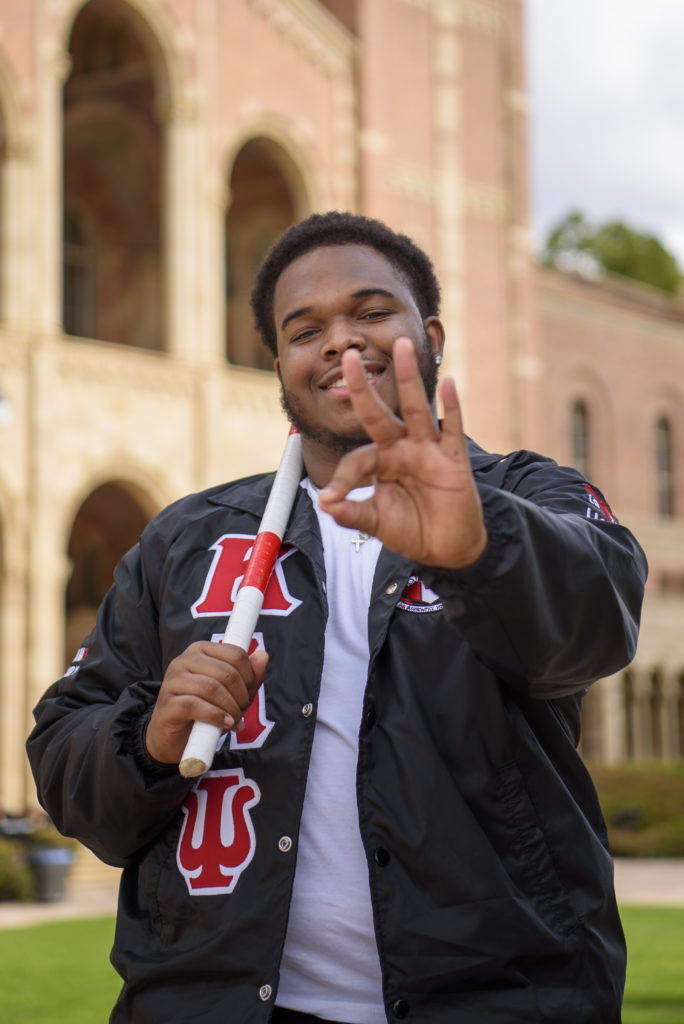
(Nicolas Greamo/Daily Bruin senior staff)
UCLA’s first sorority and fraternity do not have a house on Gayley or Hilgard Avenue. None of the active organizations of the Divine Nine have houses, for that matter.
It goes without question that having a stately house lining Fraternity and Sorority Row with predominantly white Greek-letter organizations is strongly tied to visibility. With the Divine Nine being a culturally recognized entity, its presence is well known within Black circles, yet it struggles to extend its reach outward.
Housing is an avenue to change this disconnect because it allows organizations to be visible among students to a greater extent, continues their legacies and pushes alumni to donate more funds to programs and the university.
Within the campus, housing is a place for bonding where ties of brotherhood and sisterhood can deepen and foster a safe space to host parties and gatherings without experiencing potential discrimination from other clubs and organizations.
Senay Zedingel – a third-year public affairs student, member of Alpha Phi Alpha and president of the NPHC of UCLA – said, “With more resources allows us to have visibility. When you think about Greek Life at UCLA, there’s about maybe 20 people who are in the NPHC who are Black or in a Black fraternity or sorority.”
A few months ago in November, Alpha Kappa Alpha debuted 19 sisters, increasing the number of members in the NPHC by almost double. Regardless, as a small minority on campus, he calls on UCLA to allot more resources to allow Black Greek-letter organizations more visibility and an opportunity to thrive.
Anderson said there is a need for more access to grants, a streamlined funding process, a more prominent voice in inner fraternity and sorority meetings and more interactions and an integrated allyship with other Greek councils outside of the Divine Nine.
“They are all great, and it’s great to be able to meet them at the Council of Presidents meetings,” Anderson added. “But as far as day-to-day interactions or event-wise, we don’t get much interaction with other communities. I feel like that’s a disadvantage as far as representation goes.”
Despite the calls for more recognition, members of the NPHC remain steadfast in their efforts to create change at UCLA and across the nation, as new members cycle in, binding tradition with the present.
Bailey Holliman, a second-year political science student and new member of Alpha Kappa Alpha, said her grandmother crossed at UC Berkeley during the 1950s, and she had the opportunity to share the moment she was initiated with her grandmother.
“It meant the world to me – I was crying. I was bawling because she’s in her 80s,” Holliman said. “If she did not pave the way for me, I would not be here. … I’m in higher education because she took a chance on herself along with my other family members.”
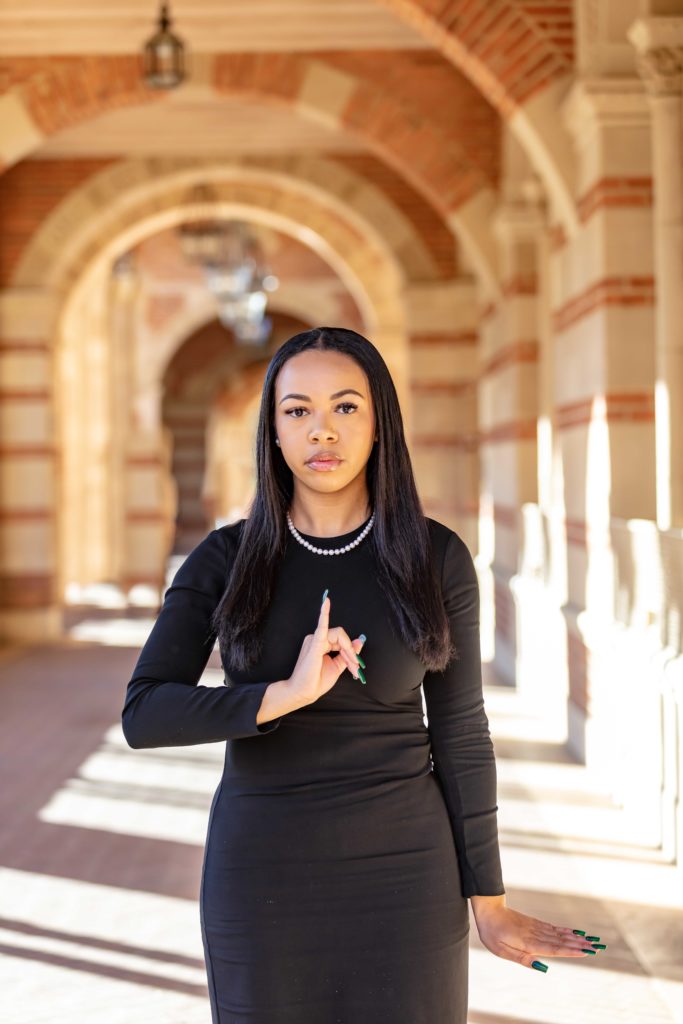
Members of the UCLA Divine Nine have proceeded to create change in their communities. One of the charter members of the UCLA Alpha Phi Alpha Gamma Xi Chapter, Don Barksdale, was the first Black basketball player to compete for the U.S. Olympic team, winning gold at the 1948 Olympics in London. Alumni of Kappa Alpha Psi include famed tennis player Arthur Ashe and Tom Bradley, the first Black mayor of Los Angeles.
In demanding visibility, a space to gather, increased funding and acknowledgement of those who paved the way, members of the Divine Nine not only honor their past but also create a blueprint towards campuswide legitimacy for other smaller or cultural Greek organizations to follow.
While this is merely a small snapshot of Divine Nine, these organizations are a mighty force that will have an impact on UCLA’s campus and beyond.

“The Black Bruin Experience” is a series created by Opinion editor Laila Wheeler, a third-year public affairs, sociology and education student. She and other Black Bruins will be exploring a variety of issues, from institutional racism to the everyday experiences of being Black in the higher education system. These columns will also highlight the multidimensionality of Blackness, including Black creativity, success, leadership and excellence. The Black community at UCLA has been tirelessly advocating for its demands to be heard, and this series aims to amplify Black voices and call on UCLA administrators to actively work toward fostering an anti-racist institution. Black Bruins are welcome to submit op-eds or letters to the editor to be published as part of this series to fully represent the diverse experiences and viewpoints of the Black community.
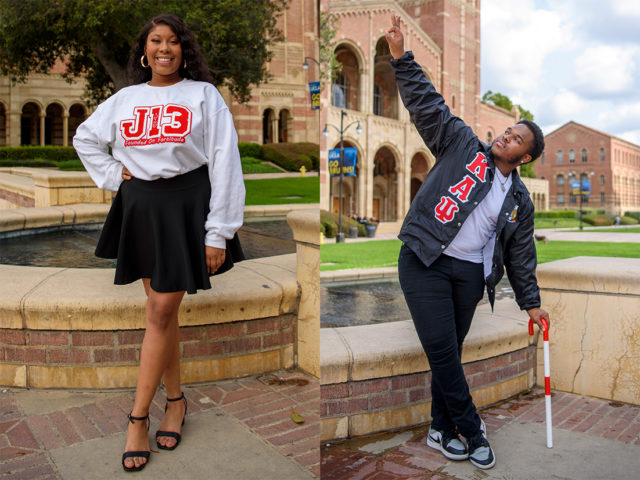



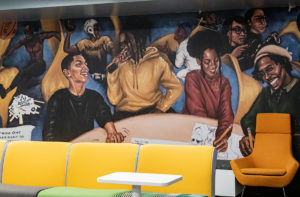
Comments are closed.